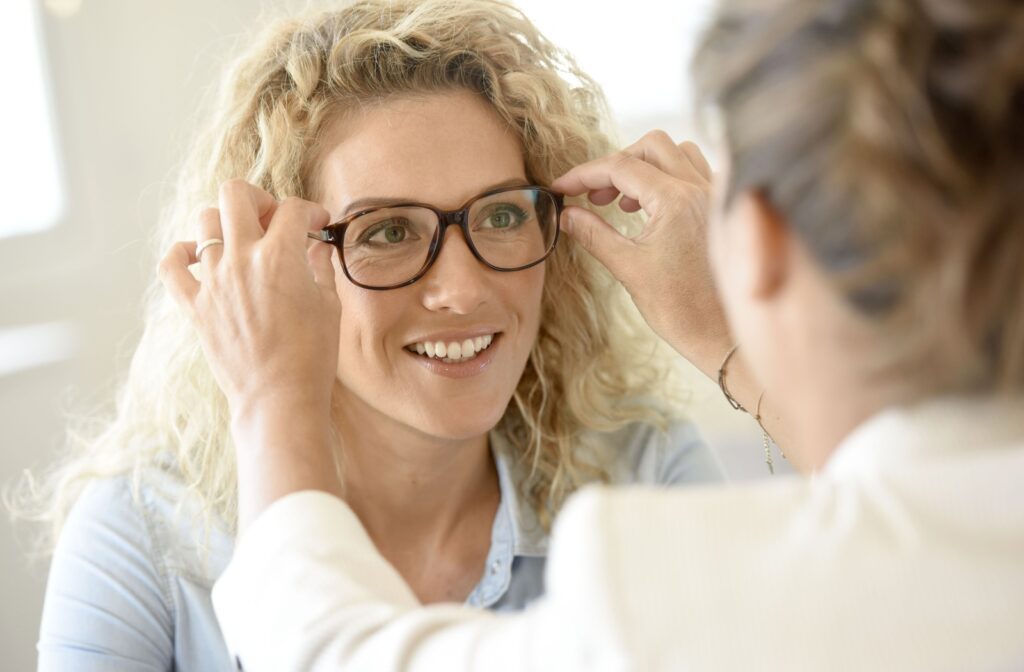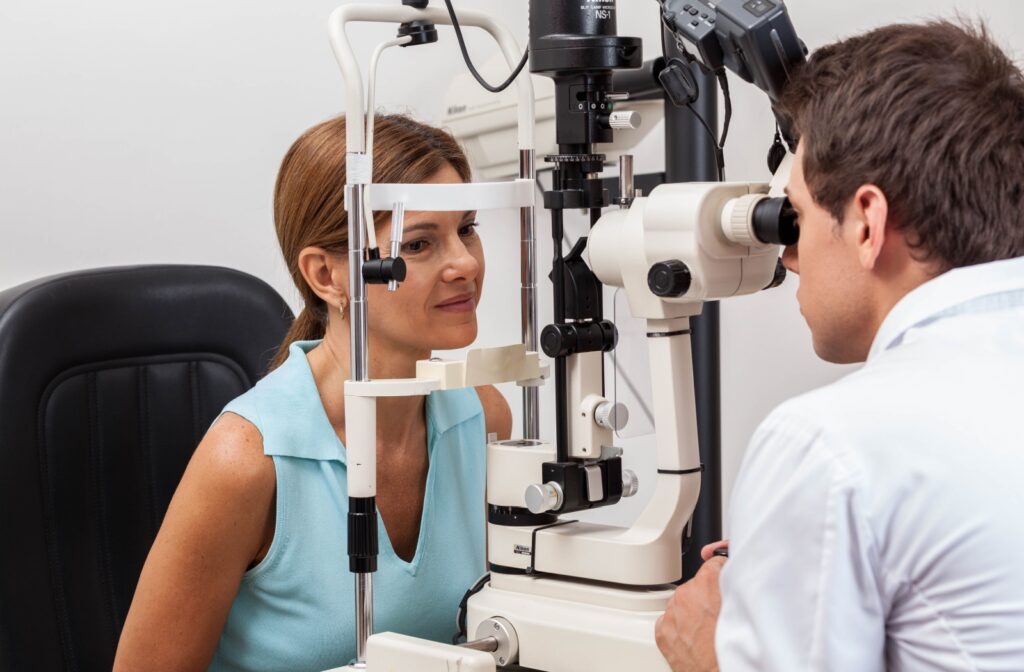Booking an eye exam is an essential part of maintaining your overall health, but if you’ve been putting it off because you’re unsure how long it takes, we’re here to help. Whether you’re scheduling a routine check-up, a contact lens fitting, or a diabetic eye exam, the time commitment is usually less than you’d expect.
Most eye exams take between 30 to 75 minutes, depending on your age, health history, and the type of exam. Understanding what happens during each type of eye exam and how long it typically takes can help you feel more prepared and confident about your visit.
Types of Eye Exams
Eye exams aren’t one-size-fits-all. Depending on your age, health conditions, and vision needs, your optometrist may recommend different types of exams. Each type serves a specific purpose and can vary slightly in length and procedure. Here are the most common types:
- Comprehensive eye exams
- Contact lens exams
- Diabetic eye exams
- Glaucoma testing
- Children’s eye exams
- Senior eye exams
Comprehensive Eye Exams: The Most Common Type
A comprehensive eye exam is more than just reading letters on a chart—it’s a full assessment of your vision and eye health. Your optometrist will check how well you see, assess your eye movements, and look for signs of eye conditions such as cataracts, glaucoma, or macular degeneration.
A standard comprehensive eye exam typically takes about 30 to 45 minutes. However, the duration may vary slightly based on your specific situation:
- Children may need more time to assess visual development and screen for issues like amblyopia (lazy eye) or strabismus (eye misalignment).
- Seniors often require additional testing for age-related conditions like macular degeneration or glaucoma.
- New patients may require additional intake questions or diagnostic testing to establish a baseline.
You should schedule a comprehensive exam depending on your age and risk factors:
- Ages 0–5: One exam between ages 3–5 to check early development.
- Ages 6–17: Once a year to catch any vision issues that may affect learning.
- Ages 18–64: Every two years, unless otherwise advised.
- Ages 65+: Annually, to detect age-related changes early.
Contact Lens Exams: A Bit More Detailed
If you wear, or are considering wearing, contact lenses, you’ll need a separate contact lens exam. This includes all the elements of a comprehensive exam, with additional measurements to ensure your lenses fit comfortably and safely.
Plan for 45 to 60 minutes for contact lens exams, especially if you’re new to contacts. This extra time accounts for:
- Measuring the curve and diameter of your cornea
- Testing how your eyes interact with lenses
- Teaching first-time users how to insert, remove, and care for their lenses
Even seasoned wearers may need a bit of extra time if they’re switching brands or types of lenses.
Diabetic Eye Exams: Monitoring More Than Just Vision
Diabetes can affect more than your blood sugar, it can quietly impact your eyes. People living with diabetes are at risk for conditions like diabetic retinopathy and macular edema, both of which can progress without noticeable symptoms.
A diabetic eye exam is designed to detect these issues early. Your optometrist will usually use dilating drops to get a better view of the retina and optic nerve, along with digital imaging to track any subtle changes.
These appointments generally take about 60 minutes, with 20–30 minutes needed just for your eyes to fully dilate. You may want to bring sunglasses, as your eyes will be sensitive to light afterward.
Glaucoma Screening: Quick but Crucial
Glaucoma is a silent threat. It’s one of the leading causes of irreversible blindness, yet it often develops without warning. Routine screening helps detect early signs so treatment can begin before damage progresses.
Common glaucoma tests include:
- Tonometry (often the “air puff” test) to measure intraocular pressure
- Visual field testing to check peripheral vision for blind spots
- Optic nerve imaging for structural assessment
Most glaucoma screening appointments take just over an hour, depending on the number of tests needed. If you have a family history of glaucoma or are over age 60, regular screening is especially important.

What to Expect Before & After Your Eye Exam
Knowing what to expect can make your eye exam more efficient and stress-free. Here are some tips:
Before Your Appointment
- Bring your current glasses or contact lenses.
- List any symptoms or changes in vision you’ve noticed.
- Know your health and medication history, especially if you have conditions like diabetes, high blood pressure, or autoimmune disorders.
- Fill out patient forms in advance if available.
After Your Appointment
- If you receive dilating drops, your vision may be blurry and sensitive to light for a few hours. Plan for transportation or wear sunglasses.
- Review your results and follow any recommendations for new prescriptions, lifestyle adjustments, or further testing.
- If prescribed new glasses or contact lenses, allow time for ordering and fitting.
Why It’s Worth the Time
We know life gets busy, but taking time for your eye exam is an investment in your health and well-being. These visits are not just about updating your glasses, they can uncover early signs of serious health issues like diabetes, high blood pressure, or neurological conditions.
At Doctors EyeCare Grand Prairie, we’re proud to offer thorough, personalized eye care for our local community. Whether it’s your child’s first exam, your annual diabetic check, or your switch to contact lenses, we’ll make sure the experience is professional, efficient, and tailored to you.
Your eyesight plays a vital role in how you experience the world, don’t leave it to chance. Routine eye exams can make all the difference in preserving your vision for years to come. Take the first step today – book your exam and give your eyes the attention they deserve.




